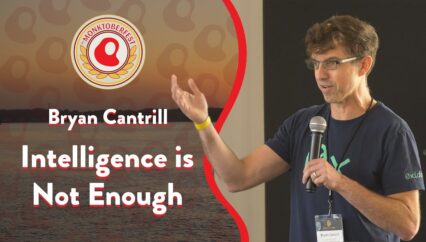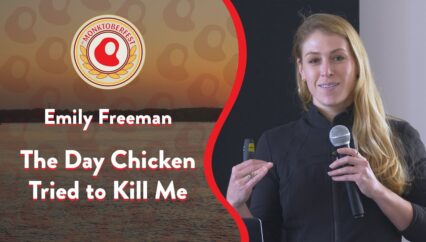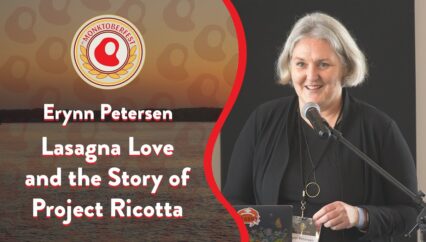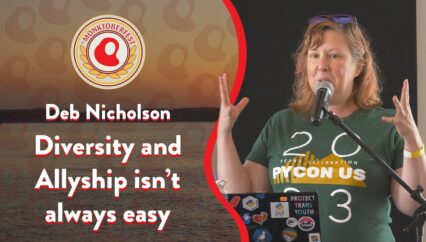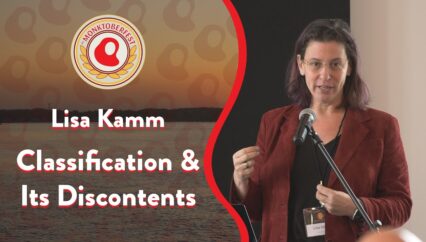As open source has continued to advance and become a ubiquitous component of the software industry substrate, it has inevitably intersected with commercial software businesses and models. This collision has been bumpy at times, sometimes predictably and other times less so. This talk offers an insider’s view on what that intersection looks like, how we should think about it and what we might expect in future.
Transcript
OK, I have a tendency to talk too fast, because I’m a fake New Yorker, I lived there for 20 years and they taught me to talk too quickly, so if I do start to go too fast, someone yell at me, I’m not going to mind. How’s everybody today? Are our brains foggy? That’s a perfect time for me to be here. Some context for folks who don’t know me, I’m not nearly as old as Mike or Bryan, I think I’m younger than Bryan or anyone who used to work at Sun in this room. I see you. Ah, there’s that sound. But I started programming when I was like 8 or 9, and I started programming full time for money when I was 14. So despite my youth, I’ve been at this in a while. This talk is something about open source, but something about just software in general. Two lifetimes ago, I worked as a developer, writing code in biotech, which is weird. Did convolutional before we called it machine learning. Given my background where I’m from, I’m Donald duck. I work at a small firm out of London, we invest in early stage companies, so that basically means for a couple of people up through your first cohort of users or customers.
On the whole, I specifically invest in what I call software infrastructure, not — and software infrastructure on the whole is open source.
About half the companies I work with actually are open source. The original title of this talk was. The Problem With Money and now it’s The Problems with Money because I kept coming up with new problems.
I have no idea how I’m going to be on time, but I will try. I’ll probably be a little fast. Can I get a show of hands. How many people here think they understand how venture capital works?
It’s actually a small show of hands. All right. Can I get a volunteer to get up and give me two sentences? Justin, get up and give me two sentences. I’m.
>> Two sentences, spend other people’s money and buy lottery tickets.
>> That’s pretty good, actually!
>> Is that and try really hard to buy the same one that everyone else is buying, but sometimes before they do.
>> That’s it. Spend other people’s money to buy lottery tickets and try really hard to spend that money on things that other people are not spending money on. That’s pretty good. I will go a little further. This might be more than you want to know, but it’s going to be useful context. By the way, my speaker’s notes, it says slash ask for volunteers, which I did.
So there’s some money sitting in a pot somewhere. That pot comes from your parents’ pension plan, your kids’ universities’ endowment, the largest mutual company on the eastern seaboard, which I happen to know a lot about for some reason.
The purpose of that money is to turn into additional money. And that additional money goes to fund pension plans. It goes to fund universities’ endowments and programs. It goes to fund life insurance policies for generations.
So despite all the people who do this job and there are a lot of jokers who do this job, it is actually a very serious job. There are a lot of other pots of money too. Some of them are your local rich family. Some of them are a dubious sovereign nation that has a bad record in human rights. If you take money from VCs, you should ask them where their money comes from. You might be surprised.
A tiny sliver of this money goes into — one or two digets, sub5%. Primarily because it’s considered an alternative investment. By the way, I hope you don’t get tired of this GIF, because it’s going to be up here for a while.
Alternatives are putting your money SMP etc. Startups on the whole are extremely risky. They go to zero. Most of the stories you hear in the news are if they go to zero, there’s a huge lawsuit and a crime, or people become billionaires but that’s like .0001% or something like that. Everything else is effectively OK, and OK is almost the same as going to 0, from the perspective of people who put money into the system.
So if that’s true, that means that the things that don’t go to 0 have to be huge.
This is my favorite one. So the way these facts trickle down to someone like me, where it is my job, I am paid to make investments and paid to spend other people’s money on lottery tickets, is that I need investments that generate a metric fuck ton of money. Also in the form of another bigger company minus item that I invested in, in that fuck ton of money.
My job is to return money to my investors. The pension funds, etc. And not just return the money they gave me, but return it in multiples, right?
If I do my job correctly, the expectation is that for every dollar they give me, I give them back — if I’m on the low end, 2 or 3. If I’m on the high end, 10-plus. If I’m in the top percentile of venture capitalists, I will give them back a hundred dollars for every dollar they give me, or more. So if I invest in 20 companies, my expectation is that the vast majority of them are going to fail or go to zero, and one if I’m lucky will do really well. That means that for that to be true, what I need from the companies, what I need from the founders, which if you remember, I invest in software infrastructure, those founders are on the whole developers, and the software is on the whole open source. What I need from those founding teams and those products and that software is that they become huge. Right? That they want to build a business, and that everyone and everything involved really, really, really wants to get a metric fuck ton of money, you might see the problem in the setup there.
OK. Developers on the whole are people who want to make things, they want to build things, in my experience. They just want — this is going to be the startup of a large number of sweeping generalizations, which means that any specific instance they might not apply. They might not apply to you, they might not apply to your friend, they might not apply to many of the people in this room. That does not make them not true.
On the whole developers don’t want to do is build a business, they don’t want to market and sell a thing. They don’t want to turn it into a product. They don’t want to set a price on it. They don’t want to navigate community versus customers. They don’t want to — I they don’t want to be accountants. They don’t want to care about margins, they do not want to operate a multi-tenant service. Operating a service is wildly different from creating the project that other people can run. It’s wildly different.
They definitely don’t want anybody — because that really is not — you get the picture.
By the way, who knows who man is?
Tell me
>>
>> I know this comes as a surprise, but later they want to be paid.
When people work on something full time, developers are no exception, they do want to be paid. They want to be able to support themselves and their families. Maybe they want to build a team to support those folks and their families. They do not want to build a thing that the whole internet relies on, but no one wants to help maintain or pay for or support, or even give things for.
How many people get the joke on this GIF? You’re old.
If you have a source, what you’re paying for is not the code. You’re not paying for the functionality that the thing does. That’s not where the value is, the thing that you give money for.
Open source is not even linearly a business model. It’s orthogonal.
And also, as far as I know, there’s no developer who wants to ship terrible things. Something that is crippled only works for one person, only works on one core, only does half the thing that you actually want it to do.
which is typically how you make it not be free.
Trust falls. When you use something, you trust it. Users and users in the broad sense, which includes customers, want to trust that the software they use does the thing it says it does. That it’s maintained, that they can submit PRs if they want to. That they can compile it. That they’re not second-class citizens to somebody else in the ecosystem.
That they can submit bug reports and someone will respond eventually. That the project will still be there tomorrow, that the software will still be there tomorrow, that you, the person who made it, will still be there tomorrow. That they will not be rumpoled by a license change.
You get the picture.
This may come as a surprise to people in this room, because on the whole, I think it’s not true of many people here, but users of every story, whether an individual hobbyist or an enterprise customer who spends millions of dollars a year on software, do not want to pay. They resist it, they fight against it. They push back on the very idea that labor should be paid.
They certainly want to feed their families, but they absolutely do not want you to feed yours. When they’re occupying the role of consumer.
Who knows who this guy is? Late night cartoons when you were younger? Yes! Thank you!
This should be self-evident … I believe that corporate interests want power. I’m not going to explain this.
This may be less self-evident. Labor wants to being paid, remember, corporate interests want power, so things that are foundations aren’t funded, they’re funded primarily by corporations, aren’t funded without a bias to politics, competition, and power.
The committees and people involved, no matter how hard they try, are caught up in a bias about competition, politics, and power.
Funding is not free. Everyone venture capital, for better or worse, what I do has become the default way to finance the creation of new businesses, of new software businesses, of new software, of new stuff for some reason, which is baffling because it’s a dumb way to finance a lot of things.
But for better or worse, it’s the default way and it’s what pretty much everyone pitches for. It certainly seems to be what every developer reaches for when they want to build something. You want to open a chain of high-end vintage shoe stores, venture capital. Want to start a music label, venture capital. Want to build a tiny utility that does one thing that will never turn into an enormous business or a product or a platform, it just does one thing and you really want to do it: Venture capital.
That’s distinctly not the same as creating, operating, and scaling a technology-driven business with excellent margins that will turn one dollar into a hundred dollars.
Sometimes you just want to solve a problem that has no business being a business, and that’s OK.
So here’s what we see happen in real life over and over, like clockwork, you write some code to solve a problem that you have, or have experienced, or were commissioned to solve by your employer, and you look like this.
You open-source it, you get stars, downloads, PRs, community builds, all the open-source numbers go up, and you think you have the power! You want to do this. People like it. It could be a thing.
Ed the world tells you you’re supposed to make a startup now. Everybody around you will tell you you’re supposed to make a startup now, but no one tells you a startup is a business or what a business even is. And you really, really do not know.
You pitch venture capitalists, they sure as hell do not tell you all the things you’re going to have to do to do the business part. They do give you money, though. You pay yourself, hire some friends, you’ve got a team now.
you keep building the thing. So exciting! Open source numbers go up.
By the way, apparently GitHub publishes a lot of GIF on Giphy of this character and I had no idea until yesterday.
Then your VCs start to ask: How are you going to make money? You pick a standard menu of stuff, oh, a free tier, maybe a model, do a status hosted thingy. Seems like everybody does the same stuff. It’s quite boring these days.
You drag your feet at the very idea of actually putting up paywalls, friction, gates of asking for money.
You’re afraid of talking about money, you’re afraid of asking for it. You feel uncomfortable, especially with this — you wish someone else to do it for you, so you hire people who are patently terrible to do things like sales and marketing and you really don’t know how to hire people. You fire them and repeat the same thing a time or two before you get the hang of it. Or you never get the hang of it.
You start to make money. Yay!
You raise more money from bigger venture capitalists, you start to feel successful, you hire more people, build more things, make more money. Things are going well, but you’re new VCs need you to make even more money, right?
Because the dollar I put in needs to turn to 100 and the dollar the next person puts in needs to turn into 100, and the next guy. All of a sudden you need to make 300 bucks the whole time. This whole pattern repeats fractaly.
Because the product and becomes successful, you get competitors. They use your code, that’s open source, to create their products, and compete directly with you.
They’re making money, and depending on your … hm … Emotional bent, they’re making your money.
You fight back. You change your license. You change the terms on your competitors. You also change the terms on your customers and your users. You damage trust. By the way, this same thing happens in closed-source software, too, just in a slightly different way.
Some of your old users decide to do something better than and they start from scratch. Repeat again. There are variations, sometimes a company will open source something strategically.
Other times VCs will hunt you down long before you go looking for money. I will do this.
Many developers who want to be founders will open source something they’re building, just because they think it’s what they’re supposed to do.
With essentially no thought given to why it should be open source or whether or not they even want to build a business, and no one — certainly not investors. Absolutely not investors — seem to have any interest in having this conversation, because we never know which of the thousand little flowers we put money to is going to turn to a rocket ship. So — oh, I lost my mic. I don’t know why. Oh, it came back.
So we are dissuaded from not having a thousand bucks.
Amazing, I’m going to finish on it time.
There is no moral to this. I don’t have any answers but I can say with extreme confidence that none of these facts and none of that’s characters or what they want will change, ever.
I of course have a pet theory as to how we can alleviate some of this industrial idiocy, but it’s an experiment in progress. Maybe I’ll talk to you about it next year. I would like to take questions, because I left out a shit ton of nuance. Stephen, am I allowed to take questions?
>> Steve: You got two.
>> Two questions. Someone yell at me. No one has a question?
Audience: The picture you’re painting, do you believe this has been the case throughout the history of venture capital, or that this is a fairly recent cancerous innovation?
>> Aneel: I think this is in the nature of the players involved. I think it has more recently — it more recently feels worse in the sense that there are currently just shy of 3,000 early-stage funds, in the US, there are 4,000 globally, and there are — no mic again — and there are low thousands of later stage funds. The sheer amount of money looking for money that thinks where it can make money in venture capital has gone on so much that there needs to be places for that money to go, and so it’s an easy place to get funding, and that naturally drives more people to seek venture capital. So this thing is self-reinforced on a loop currently. And also, even with an exchange in macroeconomic conditions, the number of funds does not go down over time, it goes up. If you look at the source of early-stage funds, it’s exploding.
Yes?
>> So if someone is listening to this, and they’re look, ooh La La, I love the money part, but wait — do you recommend that — people to be, I don’t know, be less stupid?
>> So I’m actually really — there is no such thing as a place where you can go to get a baseline knowledge of how business works in real life and business school is certainly not it. So no, unfortunately I don’t know. The only real recommendation I have is if you think you want to start a startup, go find people who have started startups, not people your age and your peer group doing it right now, a people who are a generation above you, and ask them for the truth privately, not in a public setting, and they might tell it to you.
One more?
Audience:
>> Can you imagine that people — just to get the money from a VC and just like run it —
>> WeWork!
>> So there is actually a phenomenon today, currently, that is frequent effectively, people what what they want to do is run nonprofits and the way their financing is nonprofit and they pitch their story to the venture capitalists, and at that point the venture capitalist are not up to —
>> Can you give us multiple VC funds that we don’t know about —
>> No. There are some laws and legalities. OK, I gotta go, I gotta go. Thank you very much.
[applause]




